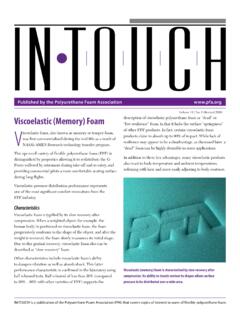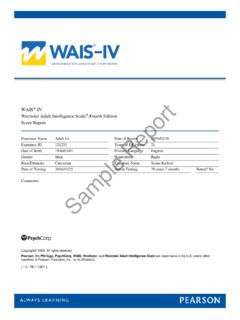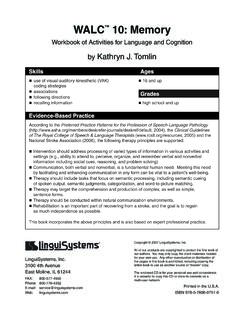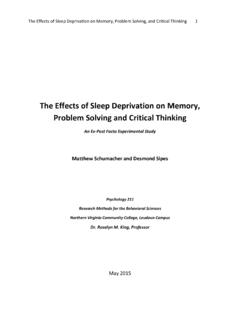Transcription of PSYCHOLOGICAL REPORT CONFIDENTIAL
1 PSYCHOLOGICAL REPORT . CONFIDENTIAL . Student Data: Name: Student Smith Age at Testing: 11 years, 11 months Date of Birth: 02/10/2002. School: Middle School Grade: 6th Evaluation Completed: 2/6/2014. Examiner: Katie Zofcin, 2nd Year Practicum Student Reason for Referral and Relevant Background Information: Student was referred for PSYCHOLOGICAL testing as part of an initial evaluation to determine her eligibility for special education services per the request of her mother and the referral team due to concerns related to her social, emotional and behavioral functioning. According to Student's Department of Child and Family Services (DCFS) social worker, LR, the department has been involved with the family since 2008.
2 Due to concerns related to maternal illness, Student and her sister moved in with their father in MA. DCFS became involved again in 2012 due to concerns about supervision in the home. After an incident between Student's sister and their father's girlfriend, the girls moved back to live with their mother in February 2012. Shortly after moving back in with their mother, an incident occurred in which Student became physically aggressive which resulted in her moving in with another family member for a short time before moving back in with her father. She was then placed in two different STARR programs, Short-Term Assessment and Rapid Reintegration, for a short period of time before ultimately moving in with her paternal aunt who had foster care experience.
3 The STARR programs were 14-45 day placements that were meant to be stabilizing and evaluative. In December 2013, Student moved to a STARR program in D Massachusetts where she currently resides. Student has been receiving services through the Compass Program, which provides in-home therapy as well provides Student with one-to-one therapy, since October 2013. Current supports provided by DCFS include supports for the family around setting age appropriate limits and providing structure at home. LR reports currently awaiting psychiatric diagnosis from Boston Children's Hospital, however she mentioned Student's previous working diagnosis was Anxiety Not Otherwise Specified.
4 School records indicate that prior to attending Middle School, Student attended E Street Elementary School in MA; B Elementary School; and N Middle School in MA. Student's term two REPORT card indicated that she received passing grades in English, History/Social Studies, Math and Science as well as an A in Do Re Mi Dragons. Grades were recorded on a pass/fail basis due to inconsistent attendance and were continued so as to not impair the self-esteem Student was building regarding her academic abilities. School records indicate that to date this school year Student has been absent 37 school days and tardy 40.
5 School days. Some of Student's absences were reportedly for medical reasons (complaints of stomach issues) others were reportedly due to environmental stressors. Student has frequent check-ins with her guidance counselor in order to process things that may come up throughout the day. Her guidance counselor noted that her check-ins are much less frequent as she is spending more time in class and utilizing her office to hold her books and switch out materials during locker time over the course of the day. However, Student does attend an independent study with her guidance counselor as a substitution for Spanish class.
6 Student Smith 1. Student reported currently living in the STARR Program with other children and adolescents. She described generally being in a happy mood. Student mentioned that she sees a counselor outside of school. Student noted that she does not wear glasses, however she reported often experiencing dizziness when she reads and that she sometimes has difficulty seeing the board in class. When asked what she does for fun, Student responded that if she were home she would enjoy hanging out with her sister or playing video games and watching her favorite television show Gator Boys.
7 Student reports that she currently takes Omneprazole for her stomach. Student indicated that her favorite subject in school Art, because she likes to draw and color. Her least favorite subject in school is Math, because she missed a lot of class from being absent and she still feels far behind the other students in her class. Student also conveyed that Math has always been a difficult subject for her. She reported not worrying about school and stated that she enjoys coming to school. Student indicated that she aspires to one day be a Veterinarian or to be a Gator Boy.. Tests Administered: Wechsler Intelligence Scale for Children, Fourth Edition (WISC-IV) Standard Battery & Selected Supplemental Subtests Behavior Assessment System for Adolescents (BASC-2) Self- REPORT of Personality Behavior Assessment System for Adolescents (BASC-2) - Teacher Rating Scales Conners 3 Teacher Children's Depression Inventory, Second Edition (CDI-2).
8 Sentence Completion Thematic Apperception Test (TAT). Consultation with LR, DCFS Social Worker (2/13/14). Student interview Record review Behavioral Observations: Overall Presentation: Student completed the administered battery during four testing sessions. The sessions ranged in duration from approximately thirty to fifty minutes. Student was friendly and cooperative throughout the sessions, engaging in spontaneous conversation between tasks as well as answering conversational questions posed. Attention: Student was able to sit without fidgeting and did not demonstrate any difficulty sustaining her attention toward the tasks at hand.
9 Attitude towards testing: Student's effort appeared variable throughout testing. At times, she exhibited appropriate effort and appeared to be highly motivated to put forth her best effort, for example when her verbal responses required elaboration in order to be awarded credit, she attempted to provide additional information. However, as tasks grew increasingly difficult Student grew frustrated and was reluctant to wager educated guesses stating I don't know and These are too hard. On the story-telling task, Student displayed a lack of confidence in her own abilities stating, that's the worst story every, I'm pretty sure no one would ever read that.
10 Cognitive Functioning Ability levels were assessed using the WISC-IV as a basis for intellectual evaluation along with the administration of additional assessments to evaluate specific areas in greater depth. The WISC-IV is one of the most widely used scales of individual intellectual development for children and adolescents. It not only measures general intelligence but, through subtest interpretation and the development of area composite scores, generates a diagnostic profile of a student's learning style. Student Smith 2. PSYCHOLOGICAL testing resulted in the following WISC-IV cognitive ability scores (Table 1).








